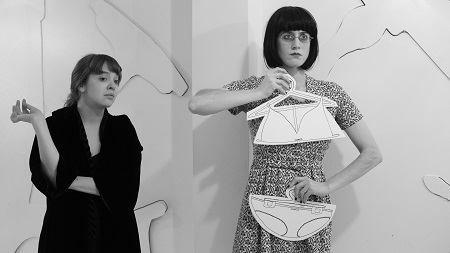
World Stage presents All Our Happy Days Are Stupid, a non-traditional comedy by Toronto’s Sheila Heti
World Stage is known for producing non-traditional theatre that eschews conventions of plot and characterization. All Our Happy Days Are Stupid, a home-grown play by Sheila Heti, is no exception. Famously considered “unstageable” for many years, it’s been taken on by Jordan Tannahill, a local artist whose star is rapidly rising. The result is a quirky show with cartoonish comedy, a piecemeal plot with absurd undertones, and charming (if scattered) meditations on the nature of happiness.
Jenny Oddi (Lorna Wright) and her parents are on vacation in Paris watching a parade when they spot Daniel Sing (Nicholas Hune-Brown), a school friend, and his parents. Both mothers are decidedly unpleasant: Ms. Oddi (Naomi Skwarna) is chronically bored and condescending, while Mrs. Sing (Becky Johnson) is judgmental and strident. The women have an argument and the Oddis leave with Jenny, while Daniel is swept up in the parade and disappears.
Jenny thinks that she is very smart and wants her mother to stop dismissing her and her peers for being only twelve years old. Mr. Oddi (Alexander Carson) is gruff and wants everyone to stick to the vacation schedule he has planned. There does, however, seem to be real attraction between husband and wife. Mr. Sing (Jon McCurley), by contrast, is simperingly clingy with his wife, who barely notices him. In fact, while continuing to have conflict with Ms. Oddi, she begins fantasizing about becoming close friends with her.
A man in a panda suit (Michael McManus) starts talking about threesomes in front of Jenny, leading to a hilarious fight between him and Mr. Oddi. Then the hotelier (Anne Wessels) of the place where both families are staying at asks Ms. Oddi, an amateur flutist, to play before their esteemed guest “The Prince For All Seasons” (Carl Wilson), and his young bride (Meghan Swaby). What the Prince really wants, though, is to steal the services of a special maid (Erin Brubacher, who directed the show along with Tannahill). And after that I’ll just say that high-jinks ensue.
The characterizations are stylized for the effect of broad comedy, almost to the point of clown in some cases. Similarly, the set and all the props are two dimensional and drawn in black on flat white surfaces, which the actors adeptly keep facing the audience. Their costumes are likewise all black, white and grey: there is no colour in All Our Happy Days Are Stupid.
A singer with a guitar (Henri Faberge), appears during scene changes and plays songs that elaborate on the mood, or the message, or the action at that point. In one scene he appears as a character, rock star Johnny Rockets; this is one of the best sections of the play, as the young stud is given some advice by an old man (Kayla Lorette) in the form of a story that is both funny and touching.
Most of the play cannot be described as “touching.” It’s not an emotional experience, but it is one full of laughter and is also mildly intellectual. By that I mean that afterward my companion and I were engaged in figuring out what all the difference scenes and characters had to do with the theme of happiness/fulfillment. It was similar to the pleasure of putting mental effort into a jigsaw puzzle and succeeding in figuring out how all the pieces fit. I also found that in the process of analyzing the disparate pieces of the play to see how they held together, I discovered some nuance in what is otherwise an unsubtle show.
All Our Happy Days Are Stupid is much like a precocious twelve year old itself: it takes its own weirdness a bit too seriously, but it’s still adorable.
Details
- All Our Happy Days Are Stupid is playing until February 14th at World Stage, Harbourfront Centre Theatre, 235 Queens Quay West
- Showtimes are Wednesday through Saturday at 8 pm with a second show on Friday at 11 pm
- Tickets are $25-$35
- Purchase Tickets at 416-973-4000 or online
Production photo provided by the company
